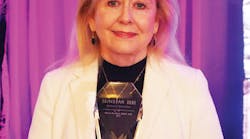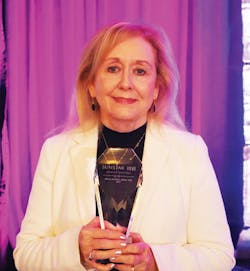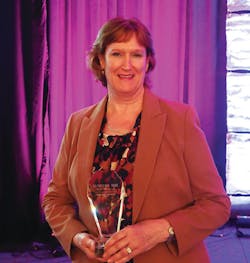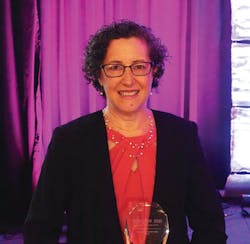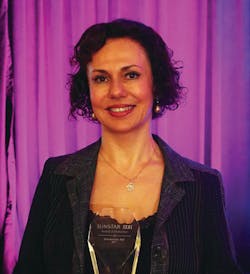2017 Sunstar/RDH Award of Distinction: Four dental hygiene leaders saluted at award ceremony
By Jackie Sanders, RDH, MBA
In 2002, eight dental hygienists were selected to receive the Sunstar Butler GUM/RDH Healthy Gums Healthy Life Award of Distinction. The program was created to recognize individuals for the additional efforts they made to assist patients in achieving healthier lives and/or make a difference in their communities. At that time, few could have realized the program would grow over the next 16 years, gaining professional recognition and making a positive impact on so many lives.
On Friday, August 11, the 2017 recipients of the Sunstar/RDH Award of Distinction were introduced at the RDH Under One Roof conference in Chicago. Four inspirational leaders were recognized and included in a growing group of dental hygienists who have inspired many of us. Nancy Burkhart, Angela Craig, Kyle Isaacs, and Elina Katsman stood at the podium and were acknowledged for their educational contributions, community programs, and significant increases of access to care. These women have joined 113 previous Award of Distinction recipients who continue to inspire and contribute to the profession of the registered dental hygienist.
I am often asked what it takes to be selected as a Sunstar/RDH Award of Distinction recipient. I have had the opportunity to spend time with many of these passionate individuals. I believe each of them has a strong internal drive to make a difference, a positive attitude, and the will to face challenges with the purpose to succeed.
Only an individual who understands the commitment and positive attitude required of a leader could create the changes that the 117 Sunstar/RDH Award of Distinction recipients have made in numerous lives. Thank you for your commitment to our profession!
The late motivational speaker, Zig Ziglar, once said, “Your attitude, not your aptitude, determines your altitude.”
When an individual discovers the means to change another’s life and make the quality of that life better, it has been defined as compassion. In many instances the element of compassion is in combination with other personal traits. The qualities found in an entrepreneur, as one who organizes and manages an enterprise, an ambassador who is the authorized messenger and representative, and/or a leader known to be the person who guides and directs a group. Each of these qualities exist in the 2016 SUNSTAR / RDH Award of Distinction Recipients.
Nancy W. Burkhart, BSDH, EdD
Charlotte, North Carolina
Although the dental profession benefits from the scientific wisdom of numerous oral pathologists, few educators have had a larger impact within the dental hygiene profession than Burkhart. She is the author of a monthly column in RDH, and many dental hygiene students have studied a textbook that she coauthored, “General and Oral Pathology for the Dental Hygienist.”
The textbook, which is currently being prepared for its third edition, was first published in 2007, and she began writing her RDH column the same year. However, it’s patients with lichen planus who likely have the greatest appreciation for Burkhart’s insights as an educator. After completing her doctorate at North Carolina State University with a dissertation on lichen planus, she participated in a one-year postdoctoral fellowship at the dental school at the University of North Carolina.
“The two oral pathologists at UNC-Chapel Hill had an interest in oral lichen planus, and I guess I caught the fever too,” she recalled. “Part of my fellowship was to be present and participate in the daily biopsy readings, and viewing tissue under the microscope gave me a totally new perspective.”
In 1997, Burkhart joined the dental program at the Texas A&M College of Dentistry as an assistant professor, with a joint appointment in dental hygiene and the stomatology center. She began cohosting an online forum with Dr. Terry Rees, the director of stomatology at the university. The International OLP Support Group supports people diagnosed with lichen planus and provides referrals to facilities all over the globe. Twenty years later, the group now has 6,500 members internationally in the support group.
After the RDH Under One Roof ceremony, Burkhart and Dr. Rees were awarded "The Dental Professional of the Year Award" at the 20th Annual Patient Conference in Newport Beach, Calif. The award was presented by the International Pemphigus and Pemphigoid Foundation.
“While conducting my dissertation research, I found that the patients with oral lichen planus were isolated,” Burkhart said. “They did not know anyone who had been diagnosed with lichen planus. I also found that they had been given very little information and did not know where to turn. Many were unhappy with their providers, had been to multiple clinicians, and did not think that they were making any progress in controlling their disease. Some even thought lichen planus was contagious!”
Burkhart teamed up with Leslie DeLong, a dental hygienist who taught in a Texas dental hygiene program, at the suggestion of an editor at Lippincott Williams & Wilkins. Both authors had approached the publisher with an idea for a textbook on oral pathology. They collaborated on “General and Oral Pathology for the Dental Hygienist.”
“The editor thought the two of us would be a great fit,” Burkhart said. “We published our first edition in 2007 and the book continues to be used as a primary text or a supplemental text at many United States schools, and international sales continue to rise.”
Craig Dickson, the publisher of RDH magazine, said, “We know that in one column Burkhart wrote about pathological symptoms on the tongue has had more than 200,000 views online, and many of her other columns have generated tens of thousands of views at RDHmag.com. She provides concise information for dental hygienists to use in their daily practice.”
Burkhart received multiple nominations for the Sunstar/RDH Award of Distinction. One California reader, Carol Perkins, RDH, wrote that she tore out a 2012 column on “lip sucking” from the magazine. “I gave it to my 26-year-old patient. I encouraged the patient to stop the habit that was causing red, chapped, dry, and peeling lips. My patient eagerly contacted me a week later to say how well the lips had healed.”
Jessica Huffman, RDH, a North Carolina dental hygiene educator, said, “Through her desire to learn, Nancy has always strived to share this learned knowledge with her peers, colleagues, and dental professionals in general. Her columns truly focus on guiding clinicians through the intra- and extraoral inspection, while encouraging them to complete a thorough assessment on every patient. Nancy hopes that by simply sharing her knowledge with one clinician, it could better or even save the life of one patient.”
In 2016, Burkhart was awarded an academic affiliate fellowship in the American Academy of Oral Medicine. She was asked to begin a new program for others to obtain this status. Perkins added, “Nancy uses her knowledge to collaborate with professionals to set the standards, to create a healthier life with early oral disease recognition and treatment.”
Angela Craig, RDH, BSDH
Edmond, Oklahoma
For many dental professionals, the networks existing within the profession make a difference in accomplishing career objectives. For Craig, her networks revolved around the Oklahoma Dental Hygienists’ Association (ODHA), the Oklahoma Board of Dentistry, and, more recently, Delta Dental.
“Through many projects over the years, I have tried to integrate my time working on projects or with groups to either benefit people directly or to increase access to dental care,” she said.
Her membership with the ODHA has led her to hold just about every position possible within the state association, including president. “If I had not been involved with ODHA all of these years, I am sure I would have left dental hygiene.”
Instead, she seized opportunities to volunteer for many activities across the state. Craig, who graduated from the University of Oklahoma College of Dentistry’s dental hygiene program in 1978, was a member of the professional development committee for Edmond Public Schools in 2001-2002. A long-term involvement with a local Junior League chapter allowed her to take part in the organization’s first dental project where she helped provide fluoride varnish at an elementary school. From 2008 through 2010, she participated in drives to collect clothing and toothbrushes for the poor. She was a founding board member for a Remote Area Medical (RAM) clinic that visited Oklahoma for the first time in 2010. In 2015 and 2016, she volunteered at clinics for the elderly and disabled, and has been a volunteer at OkMOM for every clinic they have held since 2010.
Craig is currently the ex-officio member of the ODHA’s board of trustees, per her role as a member of the Oklahoma Board of Dentistry.
“I attend all of their meetings and keep them informed of what is happening with the board,” Craig said. “Since the ODHA is the only organized body speaking for dental hygienists, it is great to have a working relationship with them. Our dental board hygienists have always kept a working relationship with the association, and I think the hygienists have a more trusting view of the board than the dentists choose to have.”
Oklahoma’s dental board consists of eight dentists, two public members, and one dental hygienist. Craig was the only female member of the board for her first three years. Her third and final term ends in June 2018.
Oklahoma mandates jurisprudence courses for the state’s dental hygienists as well as one hour of ethics every three years. Two years ago, Craig broadened her jurisprudence course to include ethics.
“It does not take a professional license to realize that the problems that are illegal are usually unethical too,” she said. “I have read that you can teach ethics, but I think the person who is teetering on breaching ethics is probably more deterred by consequences of breaking the law.”
Oklahoma’s headline-grabbing case of the board overseeing a violation occurred with a Tulsa oral surgeon in 2013 who exposed numerous patients to hepatitis through poor infection control practices. Craig, who was serving on the board, said the media exposure emphasized the importance of the board to the state’s consumers.
Craig said, “Although the community doesn’t realize this protection is happening on their behalf, they become acutely aware when stories of poor infection control practices or disciplining those in the dental profession make the news.”
In 2016, Craig joined a team of dental professionals affiliated with Delta Dental of Oklahoma’s Oral Health Foundation. The foundation’s dental clinics provide free dental care to second and sixth graders throughout the state. Craig also works in an Oklahoma City dental practice.
“We have been the first introduction to dental care for some of the kids,” she said. “I love working with the kids and feel that we are making a difference in these kids’ lives. It is the best feeling in the world!”
Kyle Isaacs, RDHEP, BHS
Monroe, Oregon
Volunteering is almost a daily ritual for Isaacs, who graduated in 1982 from the Forsyth School for Dental Hygienists in Boston.
“All of these (volunteering activities) have given me more than anything I could ever give to the patients,” she said. “Not only do they make me feel better, but I made connections that brought me partly to where I am today.”
She is a common sight at health fairs, events for Give Kids A Smile Day, and other community service activities throughout Oregon.
Isaacs adds, “Whenever I volunteer, I want to do more with any of the events. I make it a point to connect with the patients, to make them feel important and cared for. So many people are embarrassed and feel bad about their situation. I want them to know I do not judge. I am there to help and support them. I know I will never know what life is like for them, but when they are with me, I can offer them some dignity.”
Monroe is a small town halfway between Eugene and Corvallis. Isaacs recently tried to organize an event with dental hygiene students and dental hygienists in Eugene. However, she experienced obstacles in lining up the volunteers.
“One thing I have learned from my experiences is to not give up,” she said. “People don’t always call back or return emails, and it could be easy to give up. But with persistence, things will get done. I can attest to that.”
For the last two years, she has followed the leadership of Debbie Zafiropoulos, RDH (a 2016 recipient of the Award of Distinction), in developing “abnormality” screenings for Oregon residents. Zafiropoulos, the founder of the National Cancer Network, developed the concept of the abnormality screenings to be broader in the prevention-minded search for cancer beyond oral cancer.
“Oral abnormality screenings, blood pressure checks, and breast health education were provided as well as signing people up for no-cost health insurance here in Oregon,” Isaacs said.
Isaacs grew up in a family of dental professionals. Her parents are a retired dentist and dental hygienist and her brother is a practicing dentist. She moved to California after graduation, excited by the state’s relaxed stance on dental hygienists being able to administer local anesthesia. She completed the preparatory classwork to become an RDHAP (California’s version of a midlevel provider). Before she could get started on the advanced dental hygiene degree, her family relocated to Oregon.
In her new home, Isaacs obtained an expanded practice permit and decided to try providing dental hygiene services with a mobile business, catering to a variety of differing types of patients. Afterwards, she took a job with Exceptional Needs Dental Services (ENDS), treating a variety of low-income patients.
“My first time in a nursing home was a spiritual experience for me,” she said. “Knowing I was one of the few people spending time with my patients was amazing. Most don’t get much attention and, to this day, it is still emotionally exhilarating when I know I have touched them and made a difference.”
A recent development for Isaacs is Oregon’s progress with the Oral Health Equity for Vulnerable Populations program. She co-wrote the pilot project with the aim of increasing access to care for residents in long-term care facilities.
In 2015, she began working as an employee of Benton County, working with other health-care professionals in the community to improve access to dental care. The state asked for input from three counties for its Oral Health Coalition that would be “transformational, collaborative, and sustainable.” Isaacs has been collaborating with her colleagues in the county to improve access to dental services.
Isaacs said the county’s efforts will “also include direct dental hygiene services for the residents who are low income and not getting any preventive services at this time. It will include the usual dental hygiene services, oral abnormality screenings, periodontal evaluations, scaling, overall assessment, and soft denture relines, as well as application of silver diamine fluoride. We are hoping to also include going out to the farms to provide dental hygiene services for the farm workers. Some are undocumented, others not, but culturally there are roadblocks to going to get care, many cannot take time off work either.”
“I am most proud when I make a difference in someone’s life,” Isaacs said. “This might be during volunteering or helping another dental hygienist, or finding the solution to a problem for a patient. Sometimes it can be frustrating, knowing you cannot save or help everyone. But when patients come back to tell me how my suggestion made a huge difference in their lives, that is truly what fuels me to keep doing what I am doing.”
Elina Katsman, RDH
Toronto, Canada
Katsman is the founder of the Smiles Foundation, which provides dental care and other services to residents in the Dominican Republic. She was just a tourist in 1984 when the inspiration occurred.
She said, “Smiles Foundation started as an idea born after my first trip to the DR as a tourist where I saw the needs of local kids who sold peanuts or cleaned shoes, shining their bright smiles with rotten or missing teeth at a very young age.”
She quickly learned that dental care was “very expensive” and that primary health education about nutrition was “nonexistent.” She was employed as a dental assistant when she made the trip, and she returned to Canada and earned her degree in dental hygiene from Canadore College in 1986. Canadore’s dental hygiene students and staff still remain very involved with the Smiles Foundation, and help with a variety of projects.
Canadore named Katsman to the college’s alumni Hall of Fame in 2016, and she received the Premier’s Award for Ontario College Graduates in the health category in 2013.
She returned to the Dominican Republic as a dental hygienist, visiting schools, community centers, and churches. “Any place where people would listen to my broken Spanish.”
Katsman said, “That trip made me realize that teaching (at APlus Institute in Toronto) was wonderful, but what to do with people who had pain already? So the idea of a clinic came to mind.”
The Smiles Foundation today consists of 10 permanent and five mobile dental clinics in the Dominican Republic. The foundation also utilizes the skills of 187 employees and more than 500 volunteers.
In the early days of the foundation, she benefited from many contacts within her network. A former employer, Dr. Tzvi Rubinger, donated all of his equipment while renovating his dental office. Lila Kuhre, a friend who worked for an airline, arranged for the free transport of supplies to the Dominican Republic. A Dominican physician donated the space for the first dental clinic. Willowdale Rotary Club arranged for the organization’s donation of vehicles for the mobile clinics, and John DeBoer donate warehousing and personal funding to buy electrical generators.
“The rest is history filled with incredible and powerful human beings, inspiring life stories, and many great people believing in my dream,” Katsman said. “Countless hours of hard work, tears of frustration and tears of joy, disappointments and victories, and countless life lessons all led to what we are today.”
She said the foundation “works nonstop to gather dental equipment and supplies that are stored in the warehouse generously donated by Tippets World and are sent in 40-foot-high cube containers several times a year to the DR to allow children to be treated free of charge.”
She outlined several goals for the Smiles Foundation. The foundation would like to open additional clinics throughout the Dominican Republic and consider expanding to other countries. A greater pool of specialists is desired, particularly endodontists, prosthodontists, pediatric dentists, orthodontists, and implant dentists. Her goal, along with the seven members of the foundation’s board of directors, is to refurbish all their facilities with solar panels for electricity, as well as get more computers for computer education projects for troubled youth that are very popular.
As part of Katsman’s background in nutrition and oral health education, breakfast in the clinics is also a goal. “Many children come hungry and feel faint while waiting for their turn to be seen by our staff. Providing a healthy breakfast will give them a great start to the day,” she said.
As the president of the Smiles Foundation, Katsman’s daily duties include monitoring activities in the Dominican Republic through weekly reports and Skype, coordinating the collection of dental equipment and supplies that are shipped, speaking on behalf of the foundation at events, and managing the foundation’s staff.
American dental hygienists are welcome to volunteer at one of the Dominican Republic’s clinics. A two-week minimum of voluntary service is requested.
She, of course, still routinely visits the Dominican Republic, but not as a tourist.
“My biggest dream and wish is to have many people, companies, and corporations join the efforts of Smiles Foundation, so we have more funds and more people working together for more good and bigger impact!” RDH
Jackie Sanders is Manager of Professional Relations & Communications for SUNSTAR. She serves as a liaison responsible for communications with professional and industry associations, educational institutions and the dental professional community. She is a recognized and active opinion leader within the dental hygiene community and associated social networking programs. She serves on the ADEA Legislative Advisory Council, is a member of ADHA IOH Advisory Committee, and serves on several Editorial Advisory Boards.
